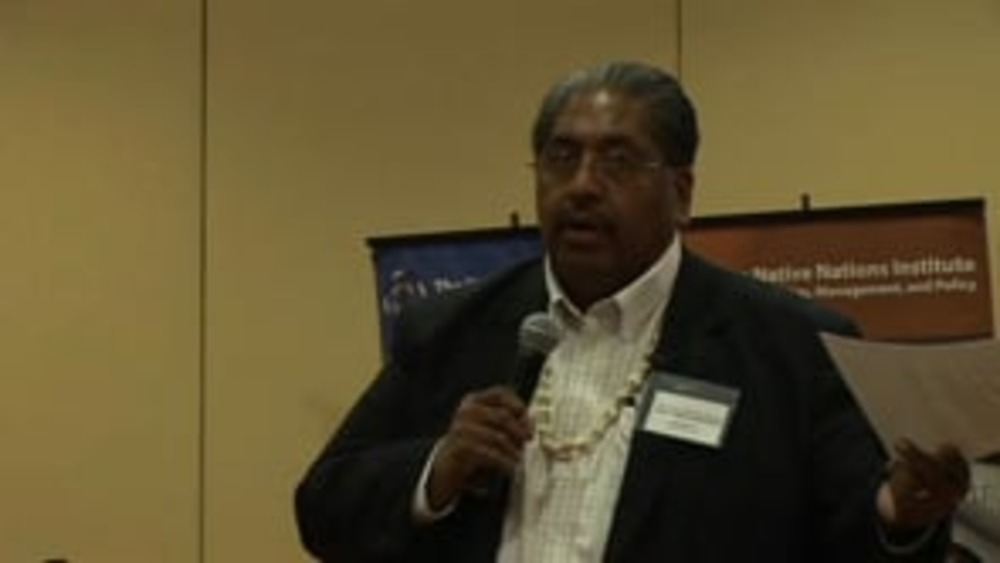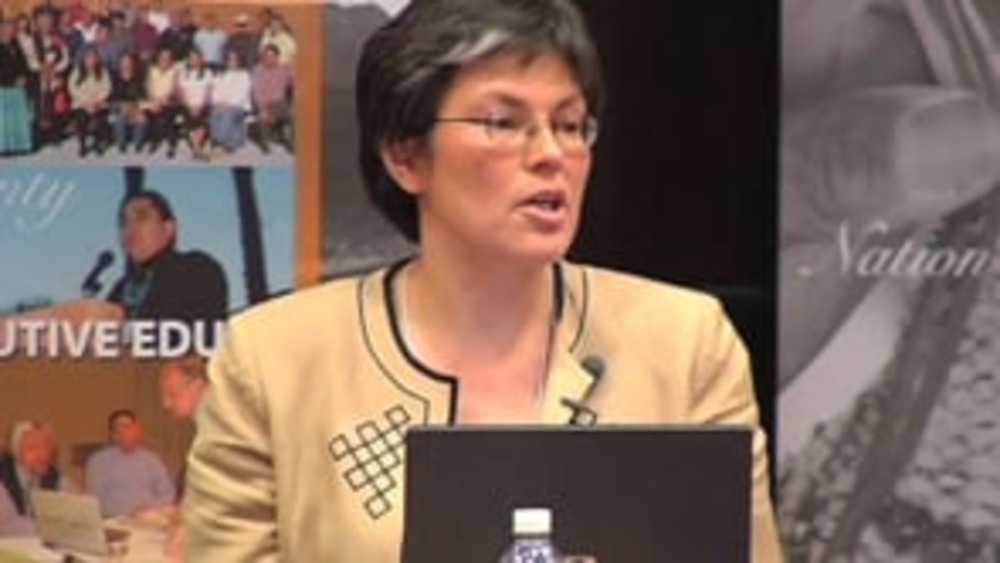Native leaders and scholars discuss some of the many formidable challenges facing leaders of Native nations, from the incredible demands on their time to the vast array of things they need to know and learn.
Additional Information
Diver, Karen. "What I Wish I Knew Before I Took Office." Emerging Leaders seminar. Native Nations Institute for Leadership, Management, and Policy, University of Arizona. Tucson, Arizona. March 24, 2010. Presentation.
Gray, James R. "Educating and Engaging the Community: What Works?" Remaking Indigenous Governance Systems seminar. Archibald Bush Foundation, Saint Paul, Minnesota; and the Native Nations Institute for Leadership, Management, and Policy, University of Arizona. Prior Lake, Minnesota. May 3, 2011. Presentation.
Kalt, Joseph P. "The Long-Term Economic Strategy Choices for Native Nations." Emerging Leaders seminar. Native Nations Institute for Leadership, Management, and Policy, University of Arizona. Tucson, Arizona. October 11, 2012. Presentation.
McGhee, Robert. Native Nations Institute for Leadership, Management, and Policy, University of Arizona. Tucson, Arizona. October 10, 2012. Interview.
Miles, Rebecca. Native Nations Institute for Leadership, Management, and Policy, University of Arizona. Tucson, Arizona. March 23, 2011. Interview.
Norris, Jr., Ned. "Perspectives on Leadership and Nation Building." Emerging Leaders seminar. Native Nations Institute for Leadership, Management, and Policy, University of Arizona. Tucson, Arizona. March 26, 2008. Presentation.
Transcript
James R. Gray:
"I'm sure all of you are aware of -- the recent events in Pakistan and the President's actions, recently. And I wanted to use this as an example to kind of comment on some of the discussions that I've heard over the last two days. One of them had to do with the questions of how much involvement the elected officials need to have in an action in order for them to properly take credit for it or to feel like they're accountable for it. And I think this is a big discussion. It occurred in the topic of economic development yesterday. I think it's occurring today in the discussions of government reform and the actions of your Nation. As an elected official, how much involvement do you personally have to have? Well, I think everyone is pretty well aware of the fact that if you're an elected official, you get way more credit than you deserve. And although I appreciate the 'lone nut' references and everything else, it's true. You do get more credit than you deserve. But with that you also get more blame than you deserve because a lot of things happen under your watch that you don't have control over but yet, regardless of the politics of your tribe or my tribe or the Nation, you're still accountable for it. Now had that incident, had that event that occurred in Pakistan to get Osama bin Laden failed, would they have blamed the Navy Seals? Nope. They would have blamed [President] Obama. And that's just the way it is. Now you just take that as a given if you're an elected official. When you swear an oath to defend your constitution and protect, fulfill your duties in office, that just comes with it."
Ned Norris, Jr.:
"And people ask me today, 'How do you like what you're doing?' And I tell them, 'I love it. I love this job. It's everything that a job needs to be. It's challenging, it's exciting, it's frustrating, it's disappointing.' All of those things that our jobs need to be in order for us to grow, in order for us to challenge ourselves, in order for us to be challenged. We have to have all of those experiences, all of those ingredients in order for us to be successful as tribal leaders."
Gerald Clarke, Jr.:
"It's not just a job; it's an adventure. Before I took office I knew I'd have to go to meetings and I do think I've put on the 20 pounds, the 'tribal council 20 pounds,' [because] I'm sitting all day in these meetings. But what I didn't know is I would be woke up at three in the morning with a car flipped over in the middle of the road or a domestic violence incident or a shooting or what have you. You can be a council member, but I think there's a difference between a council member and a tribal leader and it's all encompassing. You have to walk the walk to try to get these things done. But it's a lot more than simply going to these meetings."
Joseph P. Kalt:
"Being a tribal leader is like one of the hardest jobs in the world. And the reason for that -- right, Minnie? -- the reason for that in part is because [of] the range of things you have to know. Here you are sitting and looking at, you know, number after number and balance sheets and accounting and everything else, and at the same time your citizens are expecting you to take care of, you know, that heating bill that didn't get paid, and you've got to keep your eye on the big picture, the big strategies of the nation as a whole."
Rebecca Miles:
"Anybody who's a tribal leader today has it much harder than they did 30, 40 years ago in this respect. I know they went through things that we never have had to go through, but in this regard tribal leaders now have to know so much more than tribal leaders then. We have...I found myself having to know, here's a table full of all these foods, I have to know how all of them are made, just a little bit and be able to report on them. That's what it feels like because on every policy arena, you've got to know what's going on in all these areas and where Congress is at with this and funding is going to be cut for that and we're in litigation here and what did the judge say, 'And, oh, now this tribe's going against us and filing an amicus, what are going to do about that?'"
Robert McGhee:
"Tribal council members now have to learn all facets of government. They have to know what decisions were made in the past, why the decisions were made regarding at the tribal council level, what impact did it have on the community, and what were the necessary meaning behind that. And just not to mention the county and the city and federal law. I think they become inundated with constant communication and information from those levels of government that I don't think they were involved in years ago. I would say that was one of the hardest things to deal with, to know that, wow, it's not about just helping my tribal council, general council members. I am now the individual who is meeting with all these other representatives of government to formulate policy, decisions, and make laws. So I think it's, I think it's challenging on that part."
Karen Diver:
"The people who didn't vote for you -- some of them really hate your guts. Politics is personal in Indian Country, and after you win, there is no magic that will make them all of a sudden like you. They are going to keep hating you, and they didn't like you before and they are not going to like you now, and that's just the way it is. So get used to it. The other part of it is they are still your tribal members whether they like you or not, so it's your job to get over it, because they still deserve your time, attention, and your work as much as all of the rest of them, so you need to own the fact that they have a right to their feelings, but you still have a job to do."



